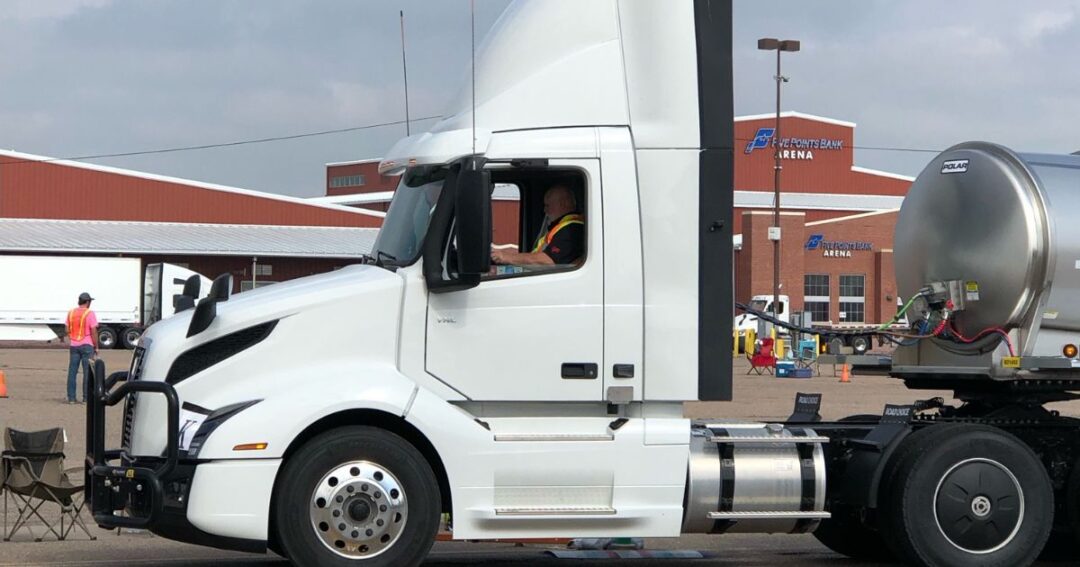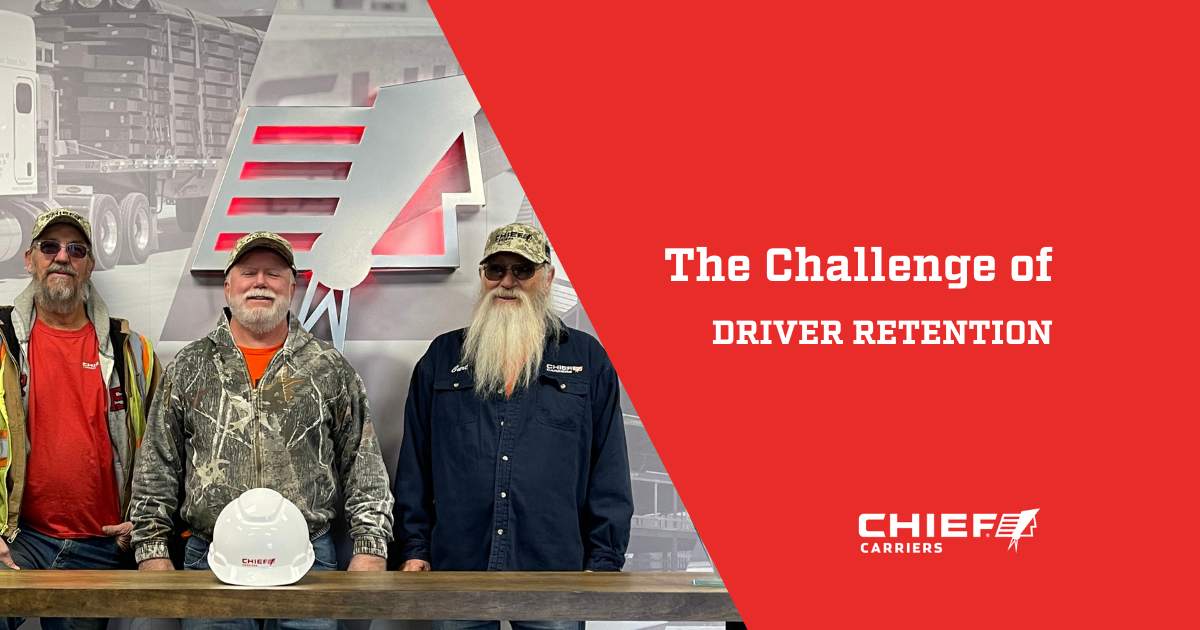Driver Retention in the Trucking Industry
Does there seem to be a revolving door at your company? On today’s episode of Driven Too Far, Andrew is joined by industry expert Mike Coble to share some of his thoughts with us, discussing driver retention strategies and how you can improve them within your company.
What recruiters should focus on, how educating employees is important, and why you need to put the correct drivers in the best seats.

Driver Retention is more than just a goal—it’s a necessity.
On a recent episode of “Driven Too Far,” we tackled this head-on, featuring Mike Coble’s invaluable insights. Mike, with his profound experience across various facets of trucking, shared strategies that can significantly improve driver retention.
We discussed everything from the critical importance of the first recruiter call to the impact of company culture on a driver’s decision to stay.
Our conversation was not just about the challenges but also about the practical steps companies can take to create a work environment where drivers feel valued and understood.
This issue touches everyone in the industry, and addressing it can lead to more satisfied drivers and a more stable workforce.
Join us as we explore the art of keeping good drivers behind the wheel, sharing stories and strategies that can make a real difference.

The Revolving Door of Trucking
The trucking industry faces a significant challenge with high turnover rates, often described as a revolving door where drivers enter and exit at an alarming pace.
This constant flux not only disrupts the smooth operation of companies but also imposes additional costs related to recruiting, training, and lost productivity. These challenges highlight the need for effective retention strategies to stabilize the workforce and ensure the long-term success of trucking companies.
From Truck Driver to an Industry Advocate
Mike Coble’s journey from a truck driver to an industry advocate provides valuable insights into the root causes of driver dissatisfaction and turnover.
His extensive experience across different sectors of the industry, including driving and executive roles, has equipped him with a deep understanding of what drivers seek in their careers.
Coble emphasizes the importance of aligning company practices with drivers’ needs and expectations as a critical step toward improving retention rates.
Through our discussions, Coble shared strategies that have proven effective in retaining drivers, such as fostering a positive company culture, offering competitive compensation, and providing opportunities for growth and development.
These practices not only enhance job satisfaction but also build loyalty among drivers, making them more likely to stay with a company long-term.
Addressing the high turnover rates in trucking requires a multifaceted approach that considers the drivers’ perspective. Coble’s insights remind us that understanding and responding to the needs of drivers is essential for creating a more stable and satisfied workforce.
By implementing targeted retention strategies, companies can slow the revolving door of trucking and cultivate a more committed team of drivers.

Starting Points for Driver Retention
Starting with recruitment, aligning drivers with the company culture is pivotal. This initial match can determine a driver’s longevity with the company, underscoring the recruitment phase’s role in retention.
It sets expectations and fosters a sense of belonging, crucial for long-term engagement.
Driver Turnover Rate
The costs of driver turnover extend beyond the immediate expenses of hiring and training. They include lost productivity, decreased morale among remaining staff, and potential disruptions to customer service.
These indirect costs can compound, affecting the bottom line more significantly than direct expenses.
Effective retention strategies focus on more than just monetary compensation. They address drivers’ needs for respect, recognition, and a supportive work environment. When drivers feel valued and see opportunities for growth, they are more likely to stay, reducing turnover rates.
Implementing a comprehensive retention plan requires understanding the drivers’ perspective. It starts with recruitment but extends into every aspect of their experience.
By prioritizing drivers’ satisfaction and aligning it with company goals, businesses can create a more stable and committed workforce.

The Role of Company Culture in Retention
Company culture plays a crucial role in driver satisfaction and retention.
A positive culture fosters a sense of belonging and support, making drivers feel valued and part of a team. This environment encourages loyalty and long-term commitment, reducing the likelihood of drivers seeking opportunities elsewhere.
Mike Coble’s career experiences highlight the impact of company culture on retention. He recalls instances where drivers stayed with companies that provided a supportive and respectful environment, even if the pay was not the highest in the market.
These anecdotes underscore the importance of non-monetary factors in retention strategies.
Conversely, Coble also witnessed high turnover rates in companies where the culture was neglectful or toxic. Drivers in such environments often felt undervalued and disconnected, leading to dissatisfaction and eventual departure. This pattern emphasizes the negative impact a poor culture can have on driver retention.
Incorporating Coble’s insights, it becomes clear that building and maintaining a positive company culture is essential for retaining drivers. Companies should strive to create an environment where drivers feel appreciated and supported, which in turn can lead to improved retention rates and overall company performance.

Practical Strategies for Driver Retention
Effective communication stands as a cornerstone in the realm of driver retention.
By fostering open channels of dialogue, companies can address drivers’ concerns and feedback in real time, creating a sense of involvement and value. This approach not only enhances job satisfaction but also builds trust between drivers and management, a key factor in long-term retention.
Recognition for a job well done is equally crucial. Celebrating milestones, safe driving records, and exceptional service reinforces drivers’ sense of accomplishment and belonging.
Simple acts of acknowledgment, such as awards or public recognition, can significantly boost morale and loyalty, showing drivers that their contributions are noticed and appreciated.
Training programs tailored to drivers’ needs and career paths offer another strategic avenue for retention. By investing in their skills and professional development, companies demonstrate a commitment to drivers’ growth, leading to increased job satisfaction and engagement.
This investment in drivers’ futures can deter them from seeking opportunities elsewhere.
The Driver Retention Effect
Successful implementation of these strategies can be seen in companies that have established mentorship programs, pairing experienced drivers with newcomers.
These programs not only facilitate knowledge transfer but also create a supportive community, making the transition into the company smoother and more welcoming.
Feedback mechanisms, such as regular surveys and open forums, allow drivers to voice their opinions and suggestions for improvement.
Companies that actively implement changes based on this feedback show a genuine commitment to creating a positive work environment, further solidifying drivers’ loyalty.
Continuous improvement of working conditions, including better scheduling to allow for work-life balance, has proven effective. Companies that prioritize drivers’ well-being by offering flexible schedules and home time see higher retention rates, as drivers feel their personal needs are respected and valued.

Leveraging Technology for Better Engagement
Technology is reshaping the trucking industry, especially in enhancing drivers’ work-life balance. Tools like mobile apps allow drivers to manage their schedules more efficiently, ensuring they can maximize home time and reduce stress.
These apps facilitate real-time communication with dispatch, helping to avoid unnecessary delays and optimize routes.
Analytics play a critical role in understanding drivers’ needs and preferences. By analyzing data on drivers’ behaviors and feedback, companies can identify trends and areas for improvement. This insight allows for tailored strategies that directly address drivers’ concerns, leading to higher satisfaction and retention rates.
Implementing technology that provides drivers with more control over their schedules and routes makes the job more attractive. Companies that have adopted such technologies report not only an increase in driver satisfaction but also a boost in efficiency and productivity.
Finally, technology fosters a culture of continuous feedback and improvement.
Platforms that encourage drivers to share their experiences and suggestions contribute to a sense of community and belonging.
This ongoing dialogue between drivers and management is crucial for making meaningful changes that benefit everyone.

Personal Stories of Impact
Mike Coble’s personal journey from a driver to an industry expert deeply informs his views on retention.
His transition showcases the importance of understanding drivers’ experiences to foster a supportive work environment. Coble’s insights emphasize building a company culture that values drivers, which he believes is key to retention.
Drivers who have worked in companies that implement Coble’s strategies share stories of feeling more valued and supported. One driver recounted how a company’s investment in training and development programs offered a clear path for career progression, making the decision to stay an easy one.
Another driver highlighted the impact of regular, meaningful communication with management. This open dialogue made them feel heard and respected, contributing to a deeper sense of loyalty to the company.
Finally, a story from a driver who benefited from flexible scheduling options illustrates the importance of work-life balance in retention.
Being able to attend important family events without stress improved their overall job satisfaction, showcasing the positive effects of Coble’s retention strategies in action.
Final Thoughts: The Road Ahead
We’ve explored various strategies for retaining truck drivers, emphasizing the importance of matching drivers with company culture, recognizing their contributions, and investing in their development.
Mike Coble’s insights and personal journey illuminate the profound impact of understanding and addressing drivers’ needs.
Implementing technology to improve work-life balance and leveraging analytics for personalized retention efforts further enhance driver satisfaction.
Stories from drivers themselves highlight the tangible benefits of these strategies, from career growth opportunities to improved communication and respect within the company.
As we look to the future, it’s clear that focusing on driver retention is essential for the success of the trucking industry.
To explore these discussions and hear more from Mike Coble, I encourage you to listen to the full podcast episode. Find it on our website, driventoofar.com, and on popular platforms like Spotify, Apple Podcasts, and YouTube.
Join us as we continue to explore ways to support and retain our essential drivers, ensuring a stronger, more resilient trucking industry.
Want to build an engaged driver community and retain your drivers. Check out Mike and his team at Recruit Hire Retain.
Andrew Winkler
Andrew Winkler is the only executive in the trucking industry willing to get in the cab and listen to you. He started out in the driver’s seat like you–loving a life on the road, missing a family at home, and yelling at dispatch over the phone. He knows how it feels to be driven too far, which is why he’s giving you the truth about trucking so you can have both your family and your career.
Interested in having Andrew Winkler appear as a guest on your show? Have a show topic idea? Want to appear as a guest on Driven Too Far? Have a question?

